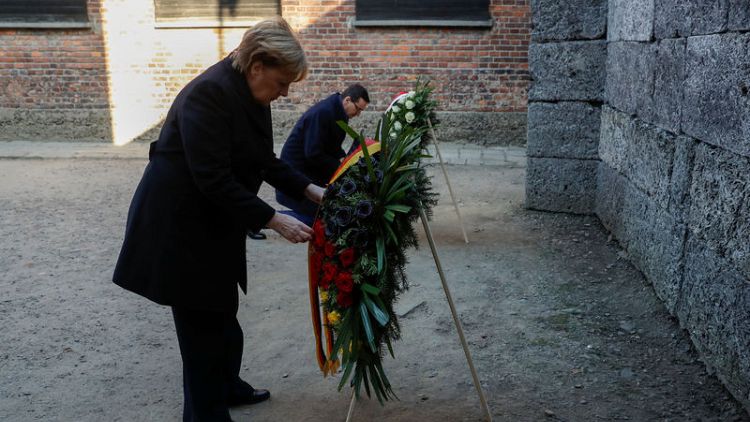By Wojciech Zurawski and Andreas Rinke
OSWIECIM, Poland (Reuters) - Angela Merkel made her first visit on Friday to the Auschwitz-Birkenau Memorial after 14 years as German chancellor, bringing a 60 million euro donation to help conserve the site where the Nazis ran their largest death camp.
Together with Polish Prime Minister Mateusz Morawiecki, a sombre Merkel toured the camp's crematorium where victims' bodies were burned, before walking through the camp's iron gate bearing the motto "Arbeit macht frei" (Work sets you free) and visiting the camp's brick barracks.
During her term, Merkel has not shied away from admitting German responsibility for its atrocities in World War Two, but her visit will ensure she follows in the footsteps of two former chancellors by seeing the site before her term ends.
"Auschwitz is a museum but is also the biggest cemetery in the world... (Memory) is the key to building the present and future," museum director Piotr Cywinski told Reuters ahead of Merkel's visit at the invitation of the Auschwitz foundation.
Merkel will announce the donation, half of which comes from Germany's federal government and half from its regional governments, at a ceremony marking the 10th anniversary of the Auschwitz-Birkenau Foundation.
The money will cement Germany's place as the largest donor to the foundation, which funds the conservation efforts for the site where more than 1 million people, mostly Jews, died in what was then Nazi-occupied Poland.
The Polish government is one of the largest financial supporters of the Auschwitz museum as a whole, having funded more than 20% of its budget in 2018 alone.
More than 3 million of Poland's 3.2 million Jews were killed during the Holocaust, roughly around half of all Jews murdered during World War Two.
The money will ensure that the conservation of 30 brick barracks in the Birkenau camp site as well as an old kitchen and latrine, for example, can continue.
"Many of the buildings were not built to last long," Cywinski said, adding that the foundation needs between 18 million zlotys to 20 million zlotys ($4.62 million to $5.13 million) annually for conservation work.
Among other tasks, the museum has to prevent the decay of relics of the victims, such as hair, shoes and eye glasses.
Two years ago Cywinski appealed to donor countries for more support. Germany is the only country that has responded to date. The United States and Poland have previously been big donors.
(Reporting and writing by Joanna Plucinska, Pawel Florkiewicz and Justyna Pawlak, Editing by Gareth Jones)
